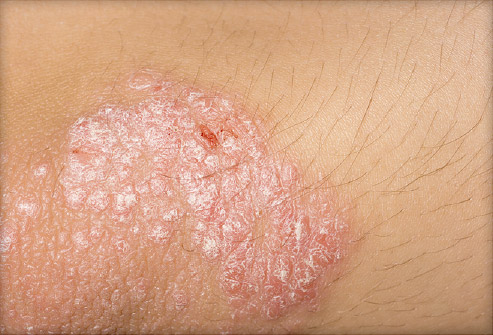Skin & Esthetics
Psoriasis
By D.A. (staff writer) , published on December 05, 2020

Medicine Telehealth Health Psoriasis Skin disease
What Is Psoriasis?
Psoriasis is a skin disorder that causes skin cells to multiply up to 10 times faster than normal. This makes the skin build up into bumpy red patches covered with white scales. They can grow anywhere, but most appear on the scalp, elbows, knees, and lower back. Psoriasis can't be passed from person to person. It does sometimes happen in members of the same family.
Psoriasis usually appears in early adulthood. For most people, it affects just a few areas. In severe cases, psoriasis can cover large parts of the body. The patches can heal and then come back throughout a person's life.
Symptoms
The symptoms of psoriasis vary depending on the type you have. Some common symptoms for plaque psoriasis -- the most common variety of the condition -- include:
• Plaques of red skin, often covered with silver-colored scales. These plaques may be itchy and painful, and they sometimes crack and bleed. In severe cases, the plaques will grow and merge, covering large areas.
• Disorders of the fingernails and toenails, including discoloration and pitting of the nails. The nails may also crumble or detach from the nail bed.
• Plaques of scales or crust on the scalp.
People with psoriasis can also get a type of arthritis called psoriatic arthritis. It causes pain and swelling in the joints. The National Psoriasis Foundation estimates that between 10% to 30% of people with psoriasis also have psoriatic arthritis.
Types
Other types of psoriasis include:
• Pustular psoriasis , which causes red and scaly skin with tiny pustules on the palms of the hands and soles of the feet.
• Guttate psoriasis , which often starts in childhood or young adulthood, causes small, red spots, mainly on the torso and limbs. Triggers may be respiratory infections, strep throat, tonsillitis, stress, injury to the skin, and taking antimalarial and beta-blocker medications.
• Inverse psoriasis , which makes bright red, shiny lesions that appear in skin folds, such as the armpits, groin, and under the breasts.
• Erythrodermic psoriasis , which causes fiery redness of the skin and shedding of scales in sheets. It's triggered by severe sunburn, infections, certain medications, and stopping some kinds of psoriasis treatment. It needs to be treated immediately because it can lead to severe illness.
What Causes Psoriasis?
No one knows the exact cause of psoriasis, but experts believe that it’s a combination of things. Something wrong with the immune system causes inflammation, triggering new skin cells to form too quickly. Normally, skin cells are replaced every 10 to 30 days. With psoriasis, new cells grow every 3 to 4 days. The buildup of old cells being replaced by new ones creates those silver scales.
Psoriasis tends to run in families, but it may skip generations. For instance, a grandfather and his grandson may be affected, but not the child's mother.
Things that can trigger an outbreak of psoriasis include:
- Cuts, scrapes, or surgery
- Emotional stress
- Strep infections
- Medications, including
- Blood pressure medications (like beta-blockers)
- Hydroxychloroquine, antimalarial medication
Diagnosis
Physical exam. It’s usually easy for your doctor to diagnose psoriasis, especially if you have plaques on areas such as your:
- Scalp
- Ears
- Elbows
- Knees
- Belly button
- Nails
Your doctor will give you a full physical exam and ask if people in your family have psoriasis.
Lab tests. The doctor might do a biopsy, remove a small piece of skin and test it to make sure you don’t have a skin infection. There’s no other test to confirm or rule out psoriasis.
References
Find articles related to: Medicine Telehealth Health Psoriasis Skin disease
More articles about Skin & Esthetics
Back to the Health Tips Index




